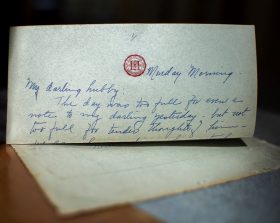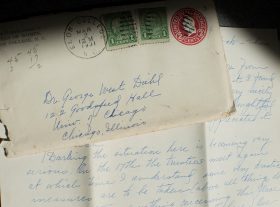Letters from Ida Diehl, who served as Elon’s dean of women during the early 1930s, paint a picture of college life and the financial crisis during the Great Depression.
 By Owen Covington
By Owen Covington
Long before College Coffee became a university tradition, Elon’s students, faculty, staff and even town residents would gather on campus to sip tea and eat tasty treats. In an Oct. 17, 1930, letter to her husband, Dean of Women Ida Diehl writes about “one of my informal teas” that drew attendees from across the campus community and the town.
“I had quite a nice crowd,” Diehl writes to husband George, who was completing a graduate degree at the University of Chicago at the time. “They were all delighted who came and those who did not come regretted it very much and said they certainly were coming next time. The reception hall was very pretty indeed. I had one of my beautiful luncheon cloths on the tea table, my silver candles and baskets with beautiful dahlias and fern with green candles for the lighting. The hall was lighted by candle light. It was perfectly beautiful.”
The letter is among the more than 70 Diehl penned to her husband during 1930 and 1931 that are now part of the university’s archives thanks to the generosity of Elon parent Septimus Bean, whose daughter, Alyx, graduated in 2018. University Archivist Chrystal Carpenter says Bean became enthralled by the university’s history when Alyx became a student, and through the years he’s been a generous donor of historical pieces he finds about Elon, particularly letters and memorabilia.

Diehl shares the details of a faculty picnic in October 1930 at Moonelon, a lakeside retreat west of campus where the university’s Lodge facility is now located. The picnic committee had gone ahead to prepare three fires, and “over one fire we fried a huge skillet of onions, and one of potatoes. Over another one a large can of coffee was steaming and the third fire boiled T-bone steaks. Really it was a feast long to be remembered.”
A March 26, 1931, letter relays her complaint about one of the fraternity groups on campus “singing songs and making a great noise” one night. “I hope they take their departure by the time the lights go out so that I can get some sleep,” Diehl tells her husband. She writes on Nov. 23 of that year that earlier in the day, Elon triumphed on the football field over Guilford College, and again was worried about another noisy night. “I hope no disturbance is raised tonight, for last night all night long the boys caroused around,” Diehl writes. “I understand they were drinking quite a lot. That seems to be the only way some people know how to celebrate a victory.”
But beyond accounts of afternoon teas and football victories, Diehl conveys the anxiety that gripped campus leadership about the future of Elon College due to its indebtedness and the increasingly dire economic recession. Diehl notes at one point that Elon was $500,000 in debt — about $7.5 million in today’s dollars. “Darling, the situation here is becoming very serious,” Diehl writes on March 2, 1931. She explains that the college’s trustees will meet again later that month to take some “very drastic measures,” including firing the college’s business manager. Diehl writes that “things are working toward a crisis.”
 Despite the challenges, Diehl remained optimistic about the college’s future and positive about the impact she was having at Elon. “I do not want you to think for one minute that I have been a failure here,” Diehl writes. “On the other hand, even though I have a pessimistic outlook at times, my administration here will always be a highlight in the progress of Elon, without a doubt. … This is a precarious situation without a doubt, but they will have to swing it some way. It will take level heads to do it, though.”
Despite the challenges, Diehl remained optimistic about the college’s future and positive about the impact she was having at Elon. “I do not want you to think for one minute that I have been a failure here,” Diehl writes. “On the other hand, even though I have a pessimistic outlook at times, my administration here will always be a highlight in the progress of Elon, without a doubt. … This is a precarious situation without a doubt, but they will have to swing it some way. It will take level heads to do it, though.”
Following the arrival of Smith as Elon’s new president, Diehl is considerably more optimistic about the future of the college. She notes in a Nov. 30, 1931, letter that Smith returned to campus after a trip to Norfolk, Virginia, and “got into the thick of the battle.” That included meeting with creditors and bankers and convincing them to “wait at least two years and give him an opportunity to work out the situation. … Otherwise, they would have to take the college, which of course they said they did not want.”
Diehl describes Smith as “untiring in his efforts” to save the college from financial collapse. “He is certainly wading into the thick of the fight,” Diehl writes. “I do not know where he is going to come out, and he says he does not know either, yet he is willing to put all he has into it.”
Thankfully, Smith was able to pull through, and Diehl witnessed the survival of the institution during one of the greatest crises it ever faced.


